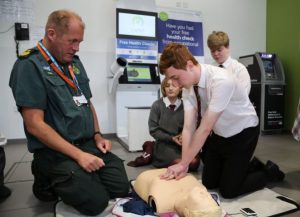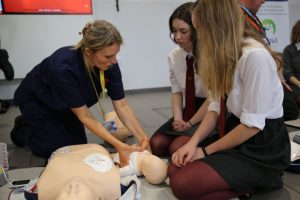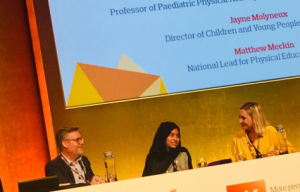This Tuesday coincided with Restart a Heart Day so the training moved to the front entrance of Southampton General Hospital as part of a public engagement event.


This Tuesday coincided with Restart a Heart Day so the training moved to the front entrance of Southampton General Hospital as part of a public engagement event.


Today the LifeLab team embarks on an energetic challenge in support of National Fitness Day. Read about how we came up with the idea, and what will inspire us to keep up the step count
“I’ve got an idea,” said Kath.
It’s the way all the best conversations start in the LifeLab office. Albeit this one began on email as inspiration was striking at a conference some 80 miles away.
To be fair, you would be hard pushed not to be spurred into action if you were anywhere near the ukactive National Summit event. Speaker after speaker took to the stage calling for more action to promote healthy and active lifestyles.
Levels of inactivity combined with poor diet and changes in how we socialise have combined to build a worrying picture of our nation’s health, both now and in the future.
Allowing young people to investigate their own lifestyles and make informed choices through scientific discovery is what underpins the work of LifeLab, so the message that we could all take up the challenge of leading healthier lifestyles really it home. It also hit Kath.
“I think we need to do something for National Fitness Day,” she continued.
National Fitness Day is, as it suggests, a country-wide movement to try and get the public doing just that – moving!
It is a chance to highlight the role physical activity plays in improving health and encompasses all manner of activity from organised classes, to individual challenges and mass events.
Before long our support for this event had resulted in a plan to ‘walk’ to the school that was the furthest away from LifeLab. By wearing activity trackers we would, as a team, combine our steps over a number of days to cover the distance required.
As it turned out that school, Nelson Mandela Primary, was in Birmingham. Brilliant. A quick calculation concluded we needed to give ourselves at least a week to rack up enough steps to cover the equivalent of the 130 miles it would take to get there.
And so it begins. Today is the day we start counting those steps, with the aim of reaching our destination in time for National Fitness Day on Wednesday 26 September. Finding ways to substitute car journeys for walking, taking the stairs instead of the lift, or just heading out for a stroll around the block will be the lifestyle of choice for the next seven days. Wish us luck!
Keep track of our progress as we march towards the midlands by following this blog here, and the team on social media. Find us @LifeLabSoton under #LifeLabGoesWalking as part of the #Fitness2Me campaign.
Dr Kathryn Woods-Townsend, programme manager for LifeLab and member of the ukactive Kids Council, joined hundreds of other delegates for the ukactive National Summit event where the call to action was very clear.
This week saw more than 700 decision makers and influencers gather at the QEII Centre in London with one thing in mind – to get the UK more active.
The ukactive National Summit saw the launch of their latest report. Alongside a report on healthy aging was the publication of Generation Inactive 2.0, which painted a worrying picture of what our future could be if we did not address the health and fitness of younger generations.
Latest statistics revealed how just one in four boys and one in five girls in England do the recommended 60 minutes of activity each day while figures from Ofcom report that children aged five to 15 spend nearly two hours a day online during the week and nearly three hours a day at the weekend.
But the mood in the room was one of conviction – we can do something about raising inactivity levels with a united and determined multi-agency effort.
A very clear message also came out of the day – we should be doing less of telling young people what to do, and more of listening to them if we are going to find a solution. The theme of the report: ‘Nothing about us, without us’ resonated throughout the event.
The call to action came from all political sides, from all ages and from all organisations committed to improving the health of the nation.
The summit included some impassioned speakers; from Baroness Tanni Grey Thompson urging the government to include physical activity at policy level, to Tom Watson MP describing his remarkable weight loss and reversal of Type 2 diabetes through diet and exercise. But none were more inspiring than student Rahela who made the very clear point; young people need to have a voice – involve us, don’t lecture us.

She urged people in the room to consider how they deal with young people spending too much time on a screen. “Don’t try to stop screen time, but use technology to our advantage.” That really struck a chord with the team from LifeLab as that is the precise approach being adopted for the EACH-B project.
The project, funded by the National Institutes of Health Research, is currently developing an application to run on mobile devices that combines digital platforms to improve the health of younger generations. EACH-B was also praised in the Generation Inactive 2.0 report, for how it was attempting to capitalise on the increasing use of digital technology by younger people and use it to sustain engagement in activity and fitness.
Delegates came away from the day incredibly inspired to redouble efforts in making change happen. There was a feeling of momentum too as we look ahead to National Fitness Day on 26 September, as a real chance for the country to get behind an initiative that will shine a light on just how important getting active is to the health of our generation and those to come.
©2024 University of Southampton